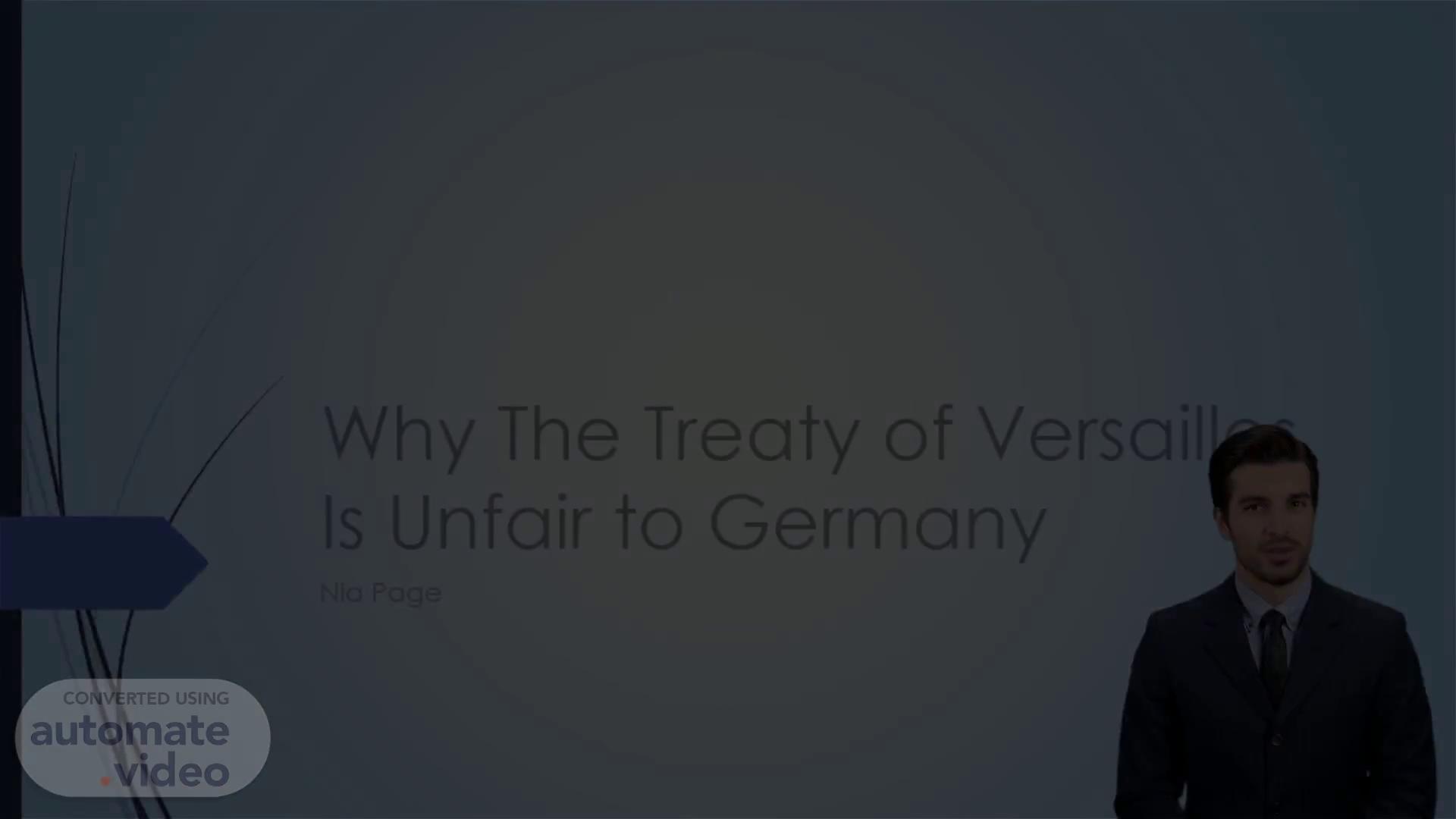
Why The Treaty of Versailles Is Unfair to Germany
Scene 1 (0s)
[Virtual Presenter] Why The Treaty of Versailles Is Unfair to Germany Nia Page.
Scene 2 (9s)
[Virtual Presenter] One of the peace treaties that ended World War I was the Treaty of Versailles. The goal was to restore balance and stability to Europe after the war, but it has achieved the exact opposite. Our sense of betrayal and trickery is strong, and this is why... This Photo by Unknown Author is licensed under CC BY-SA.
Scene 3 (33s)
[Audio] War Guilt There is bias and unjustice in Article 231 of the treaty. Rather than acknowledge the complex web of alliances and other nations' actions that contributed to the war, it places full responsibility on Germany (Pavlac, pg. 162). We did not cause the war; we were defending ourselves against Russia. Serbia's ally, Russia, mobilized for war following our ally Austria-Hungary's declaration of war against Serbia. Germany requested that Russia cease war preparations. As a result of Russia's refusal, we declared war. This Photo by Unknown Author is licensed under CC BY This Photo by Unknown Author is licensed under CC BY-ND.
Scene 4 (1m 29s)
[Audio] Reparations Because we were identified as the sole cause of the war happening, we are now expected to pay reparations for the damages caused by the war. In total, the amount is 132 billion gold marks, and that amount is over the top and financially crippling for the country. The economic devastation caused by the war severely limits our ability to pay such a large sum. The effects of reparations have had a negative impact on our economy, and hyperinflation is the result (Blakemore, 2019). This Photo by Unknown Author is licensed under CC BY-SA.
Scene 5 (2m 11s)
[Audio] Demilitarization of Rhineland Demilitarization in Germany poses a threat to national security and cripples the country. In the absence of means of defense, we feel vulnerable and at risk of being attacked in the future. Germany is disadvantaged due to the permanent demilitarization of the western bank of the Rhineland. France and Belgium are not invadable, but we could easily be invaded by France (Pavlac, pg. 162). This Photo by Unknown Author is licensed under CC BY-SA-NC.
Scene 6 (2m 50s)
[Audio] Loss of Territories The treaty led to the loss of significant territories for us. In addition to losing Alsace-Lorraine and some pieces of land to Belgium, we also lost a large portion of territory to Denmark, despite the fact that Denmark declared itself neutral during the war (Pavlac, pg. 162). The extent of these territorial losses is excessive and humiliating at the same time..
Scene 7 (3m 21s)
[Audio] Disarmament Article 160 of the treaty subjects us to extensive disarmament measures. Germany is only allowed to field seven infantry divisions and three cavalry divisions in its army. In addition, the German army is limited to 100,000 troops, including officers and men (Internet History Sourcebooks, 2019). Security concerns and the prevention of future aggression motivated the Allied powers to take this step. However, now that we lack the means to defend ourselves, we feel even more vulnerable to future aggression..
Scene 8 (4m 2s)
[Audio] References Blakemore, E. (2019, June 19). Germany’s World War I Debt Was So Crushing It Took 92 Years to Pay Off. Https://Www.history.com/News/Germany-World-War-i-Debt-Treaty-Versailles. Brian Alexander Pavlac. (2015). A concise survey of western civilization : supremacies and diversities throughout history. Rowman & Littlefield. Internet History Sourcebooks. (2019). Fordham.edu. https://sourcebooks.fordham.edu/mod/1919versailles.asp.